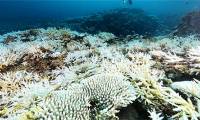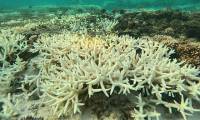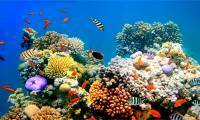
For the first time in history, coral in the Gulf of Aqaba lost its natural color due to record high sea temperatures this past summer.

Rising ocean temperatures are fueling mass bleaching of coral reefs around the world, putting many species at risk of extinction.

Australian researchers have confirmed that wind patterns played a major role in causing severe coral bleaching on Australia's Great Barrier Reef.

Corals are marine animals that exist in the form of small polyps resembling sea anemones, often living in colonies consisting of many identical individuals.

Coral reefs around the world are experiencing mass bleaching due to the climate crisis causing ocean temperatures to rise, two scientific agencies announced on April 15.

Scientists confirmed the new bleaching episode after conducting an aerial survey of 300 'shallow' coral reefs as sea temperatures threaten the habitat of thousands of marine

Some corals are creating a 'sunscreen' to protect themselves from rising sea temperatures, a study by scientists at the University of Southampton (UK) said.

The successful reproduction of Atlantic column corals in the artificial environment opens hope for saving the dying coral population in Florida.

A group of scientists scouted a rare deep blue hole (Blue Hole) in the Great Barrier Reef. This green hole is located more than 200 km from Daydream island off northeast

Australian scientists have discovered that some types of algae can switch genes to withstand higher temperatures, avoiding coral bleaching.
 For the first time in history, coral in the Gulf of Aqaba lost its natural color due to record high sea temperatures this past summer.
For the first time in history, coral in the Gulf of Aqaba lost its natural color due to record high sea temperatures this past summer. Rising ocean temperatures are fueling mass bleaching of coral reefs around the world, putting many species at risk of extinction.
Rising ocean temperatures are fueling mass bleaching of coral reefs around the world, putting many species at risk of extinction. Australian researchers have confirmed that wind patterns played a major role in causing severe coral bleaching on Australia's Great Barrier Reef.
Australian researchers have confirmed that wind patterns played a major role in causing severe coral bleaching on Australia's Great Barrier Reef. Corals are marine animals that exist in the form of small polyps resembling sea anemones, often living in colonies consisting of many identical individuals.
Corals are marine animals that exist in the form of small polyps resembling sea anemones, often living in colonies consisting of many identical individuals. Coral reefs around the world are experiencing mass bleaching due to the climate crisis causing ocean temperatures to rise, two scientific agencies announced on April 15.
Coral reefs around the world are experiencing mass bleaching due to the climate crisis causing ocean temperatures to rise, two scientific agencies announced on April 15. Scientists confirmed the new bleaching episode after conducting an aerial survey of 300 'shallow' coral reefs as sea temperatures threaten the habitat of thousands of marine
Scientists confirmed the new bleaching episode after conducting an aerial survey of 300 'shallow' coral reefs as sea temperatures threaten the habitat of thousands of marine Some corals are creating a 'sunscreen' to protect themselves from rising sea temperatures, a study by scientists at the University of Southampton (UK) said.
Some corals are creating a 'sunscreen' to protect themselves from rising sea temperatures, a study by scientists at the University of Southampton (UK) said. The successful reproduction of Atlantic column corals in the artificial environment opens hope for saving the dying coral population in Florida.
The successful reproduction of Atlantic column corals in the artificial environment opens hope for saving the dying coral population in Florida. A group of scientists scouted a rare deep blue hole (Blue Hole) in the Great Barrier Reef. This green hole is located more than 200 km from Daydream island off northeast
A group of scientists scouted a rare deep blue hole (Blue Hole) in the Great Barrier Reef. This green hole is located more than 200 km from Daydream island off northeast Australian scientists have discovered that some types of algae can switch genes to withstand higher temperatures, avoiding coral bleaching.
Australian scientists have discovered that some types of algae can switch genes to withstand higher temperatures, avoiding coral bleaching.









 Why did the ancient Babylonian civilization perish? Was it because they considered 'that thing' a daily meal?
Why did the ancient Babylonian civilization perish? Was it because they considered 'that thing' a daily meal? Just discovered a 72km 'tear in the Earth', the world's second largest country is in fear of a tsunami attack
Just discovered a 72km 'tear in the Earth', the world's second largest country is in fear of a tsunami attack Top 7 facts about the hottest place in the world, where you can fry eggs at outdoor temperature
Top 7 facts about the hottest place in the world, where you can fry eggs at outdoor temperature The Qing Dynasty collapsed, what surname did 20,000 royal descendants change to to integrate into the new era?
The Qing Dynasty collapsed, what surname did 20,000 royal descendants change to to integrate into the new era? After 389 days in the Arctic, costing more than $160 million, hundreds of scientists brought back bad news: What was it?
After 389 days in the Arctic, costing more than $160 million, hundreds of scientists brought back bad news: What was it? How long does it take to fall in love with someone?
How long does it take to fall in love with someone? How much silver has ever been discovered in the world?
How much silver has ever been discovered in the world? How does an atomic bomb work?
How does an atomic bomb work?